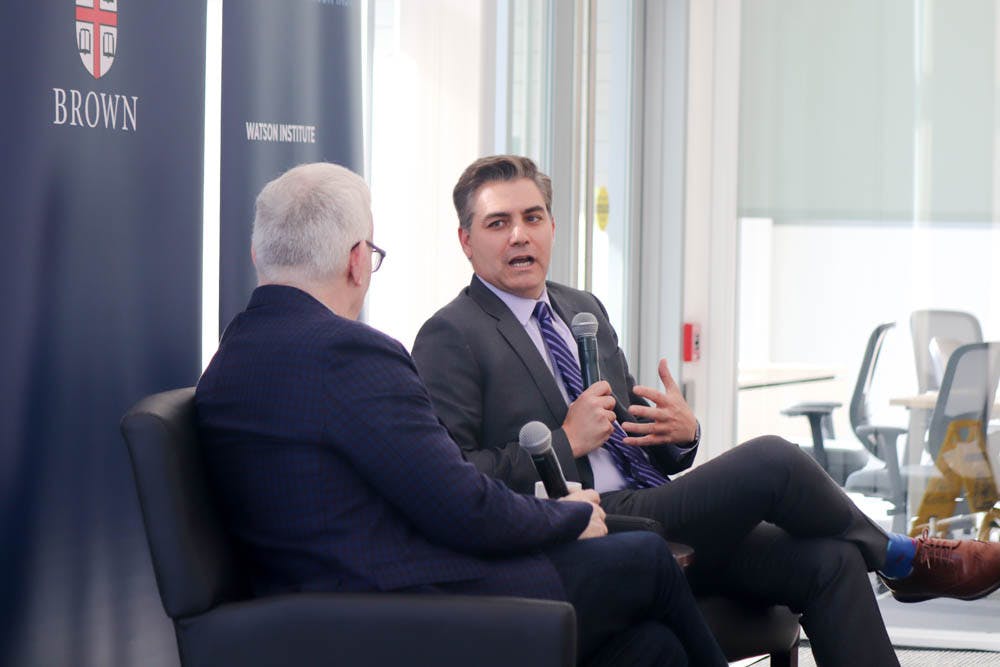Faced with “fake news” accusations from President Donald Trump himself, Chief White House Correspondent for CNN Jim Acosta knows a thing or two about standing tough in the heavily scrutinized “new frontier of journalism.”
Acosta spoke on his experience at the White House, the impacts of modern media, the future of journalism and restoring public trust in national news sources in an event hosted by the Watson Institute for International and Public Affairs Wednesday titled “Journalism in the Trump Era: A Conversation with Jim Acosta.”
Jonathan Klein ’80, former president of CNN/US and leader of a non-credit seminar at the Watson Institute, moderated the discussion. Klein brought Acosta to CNN in 2007 and said that Acosta was one of the greatest hires he made during his time there.
Acosta has clashed with President Trump on multiple occasions. On Nov. 8, 2018, the White House revoked Acosta’s press pass after Acosta questioned Trump about the Russia investigation and the Central American migrant caravan. Acosta has also received death threats for his coverage.
“You have to be willing to sacrifice yourself and take the hits in order to get the news that will be penetrating,” Acosta said. “We cannot let intimidation efforts bully us into silence. … I have to do what I think is right.”
Asked how he developed the poise to deal with criticism from the President, he said: “Some of it is experience. You know a president isn’t supposed to treat (journalists) as enemy of the people.”
In the era of “fake news,” Acosta is aware that he could make a mistake. But, “there is a difference between erroneous news and fake news.”
“My base is people that want to hear about the truth and care about the truth. … I just tell myself before doing a live shot, ‘this is just the news … this isn’t brain surgery.’” In his years as a journalist, Acosta said has never witnessed a conspiracy to mislead the public.
“We spend a lot of time and energy fact checking” at CNN, which he says “pisses off the Trump base,” as it prevents Trump from saying anything that he wants.
Acosta also described his daily routine in a world dominated by technology. While he leaves his phone on silent to get at least six hours of sleep a night, he has to check it for news periodically throughout the day. “I have to live that way. … I don’t want to be behind the curve.”
Acosta also began using encrypted text-messaging under the Obama administration. “There is deep concern not only on our part … (about) who could be reading” our messages. It’s a “climate of fear we are all operating under,” he said.
During the question and answer session, Acosta was asked how to restore public trust in modern media and combat its “echo chamber.” Acosta said he pushes himself to engage with alternate perspectives to find content that resonates with the public. “There’s still a nucleus of people out there that still want us to be tough.” He added that some Fox News employees send him direct messages over social media encouraging him to keep pressing Trump for truth in the face of criticism.
Consumers are also partially responsible for lack of trust in media, he said. “In all of the major news outlets, people are acting in good faith,” he said, suggesting people should approach news with an open mind and trust that news sources are not trying to intentionally mislead the public. Consumers need “to be more sophisticated readers of news … getting news from variety of sources (and) harvesting a good spectrum of information.”
During his tenure at CNN, Acosta served as national political correspondent, leading the network’s coverage and traveling alongside the campaign trails of Mitt Romney in 2012 and Donald Trump in 2016. Previously, Acosta worked as a reporter for local news stations in Chicago, Dallas and Knoxville, Tennessee, and as a correspondent for CBS News from 2003 to 2007. Acosta is writing a book titled “The Enemy of the People: A Dangerous Time to Tell the Truth in America,” which is scheduled for publication in June.
Brian Kirz ’22 asked Acosta how he picks and chooses which battles he wages with Trump and Press Secretary Sarah Huckabee Sanders. Acosta noted an instance when he asked a pointed question to Sanders on Trump’s comment about whether ‘Democrats hate Jews,’ an answer that she sidestepped and responded to with a misleading comment on abortion. Acosta said that he ignored her answer and now regrets letting falsehoods like that slide, as they can harm the public conscious.
After the discussion, Kirz said he “really enjoyed listening to Jim Acosta on principle. During a time where illiberalism and press-averse strongmen are starting to rear their ugly heads again, Jim Acosta has one of the hardest jobs.” However, Kirz found Acosta’s answer to his question “both heartening and sad.”
“If press conferences are becoming rarer and rarer, then I believe journalists need to be even more discerning when it comes to asking the questions they don’t want you to ask — about the topics they bury under hundreds of intentionally outrageous things.”





